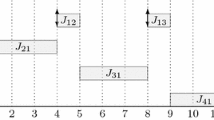Abstract
We address lateness and tardiness scheduling policies for real-time systems. It is well-known that preemptive Earliest Deadline First (EDF) minimizes the worst lateness and tardiness of a finite set of tasks with known arrival times, service times and deadlines to the finishing time, on a uniprocessor. We extend this result significantly, to include an arbitrary (possibly infinite) number of tasks with arbitrary arrival and service times, and deadlines, and to show thatEDF
-
1.
minimizes the lateness and tardiness of the tasks that are in the system at an arbitrary time.
-
2.
minimizes lateness within a busy interval, for an arbitrary, possibly infinite number of tasks.
-
3.
maximizes the time to the first missed deadline, and
-
4.
minimizes the length of time during which there is at least one missed deadline in the system.
We also show that a combination ofEDF and Shortest Remaining Processing Time First (SRPTF) policy minimizes maximum latenesses in a vector sense (as defined tin the paper) and minimizes the number of tasks that miss their deadline at the time the first missed deadline occurs. For non-preemptive non-idling polices, we establish new, similar results in a stochastic sense.
We attempt extending our findings to multiprocessor systems. We demonstrate that under the assumptions of arbitrary distributions of arrival times, service times and deadlines, our results no longer hold true. When a further assumption of unit-length service times and integer-valued arrival times is introduced, we are able to re-establish the results in the multiprocessor case.
Zusammenfassung
Diese Arbeit beschäftigt sich mit Lösungsansätzen für das Problem der verfrühten (Lateness) bzw. verspäteten (Tardiness) Beendigung von Tasks in Realzeitsystemen. Es ist hinlänglich bekannt, daß Earliest Deadline First (EDF) Algorithmen die schlechtest mögliche Lateness und Tardiness minimieren, vorausgesetzt es handelt sich um eine endliche Menge von Tasks mit bekannten Ankunftszeiten, Servicezeiten und Deadlines auf einer Einprozessor-Architektur. Wir erweitern die bekannten Resultate signifikant um die Möglichkeit der Handhabung einer unbestimmten (möglicherweise unendlichen) Anzahl von Tasks mit freien Ankunfts- und Servicezeiten und mit unbestimmten Deadlines. Wir zeigen dabei die Gültigkeit der folgenden Aussagen:
-
1.
EDF minimiert Lateness und Tardiness von Tasks, die sich zu einem beliebigen Zeitpunkt im System befinden.
-
2.
EDF minimiert Lateness innerhalb eines aktiven Intervalls für eine beliebige, möglicherweise unendliche Anzahl von Tasks.
-
3.
EDF maximiert die Zeit, bis die erste Deadline versäumt wird.
-
4.
EDF minimiert die Zeitspanne, während der zumindets eine versäumte Deadline im System ist.
Weiters zeigen wir, daß eine Kombination vonEDF und Shortest Remaining Processing Time First (SRPRF) doppelt minimierende Wirkung hat. Minimiert wird sowohl die schlechtest möglichen Lateness im System im Sinne eines Vektors (wie in der Arbeit definiert), als auch die Anzahl von Tasks die ihre Deadline zu dem Zeitpunkt versäumen, zu dem die erste versäumte Deadline überhaupt auftritt. Für non-preemptive, non-idling Algorithmen leiten wir ähnliche neue Resultate auf stochastischer Basis ab.
Wir verifizieren unsere Ergebnisse für Multiprozessor-Architekturen und demonstrieren dabei, daßunter der Annahme beliebiger Verteilung der Ankunftszeiten, Servicezeiten und Deadlines unsere Resultate nicht länger gültig, bleiben. Unter der Voraussetzung weiterer Annahmen, nämlich der Beschränkung der Servicezeiten auf die im System verwendeten Zeiteinheiten und auf ganzzahligen, Ankunftszeiten, können wir die weiter oben angesprochenen Resultate auch für den Fall eines Mehrprozessorsystems aufrecht erhalten.
Similar content being viewed by others
References
Bhattacharya, P. P., Ephremides, A.: Optimal scheduling with strict deadlines IEEE Journal on Automatic Control34 (7), 721–728 (1989).
Coffman, F. G. Jr. (ed.): Computer and job shop scheduling theory. New York: John Wiley & Sons 1976.
Hong, K. S., Leung, J. Y-T.: On-line scheduling of real-time tasks. Proceedings of the IEEE International Real-Time Systems Symposium, pp. 244–250. Alabama: Huntsville December 1988.
Moder, J. J., Elmaghraby, S. E. (eds.): Handbook of operations research. Van Nostrand Reinhold, 1978.
Jackson, J. R.: Scheduling a production line to minimize maximum tardiness Research Report No. 43. Los Angeles: University of California 1955.
Lawler, E. L., Lenstra, J. K., Rinnooy, Kan, A. H. G., Shmoys, D. B.: Sequencing and scheduling: Algorithms and complexity. Amsterdam, 1989.
Lenstra, J. K., Rinnooy Kan, A. H. G., Brucker, P.: Sequencing by enumerative methods. Amsterdam: Mathematisch Centrum 1977.
Liu, C. L., Layland, J. W.: Scheduling algorithms for multiprogramming in a hard-real-time environment. Journal of the Association for Computing Machinery20(1), 46–61 (1973).
McMahon, G., Florian, M.: On scheduling with ready times and due dates to minimize maximum lateness. Operations Research23(3), 475–482 (1975).
Mok, A. K.: The design of real-time programming systems based on process models. Proceedings of the IEEE International Real-Time Systems Symposium, pp. 5–17, December 1984.
Mok, A. K., Dertouzos, M. L.: Multiprocessor scheduling in a hard real-time environment. Proceedings of the Seventh Texas Conference on Computing Systems, pp. 5.1–5.12. Houston, Texas, October 1978.
Panwar, S. S., Towsley, D., Wolf, J.: Optimal scheduling policies for a class of queues, with customer deadlines to the beginning of service. Journal of the Association for Computing Machinery35 (4), 832–844 (1988).
Conway, R. W., Maxwell, W. L., Miller, L. W. (eds.): Theory of scheduling. Massachusetts: Addison-Wesley, Reading 1967.
Ross, M. S.: Stochastic processes. New York: John Wiley & Sons 1983.
Smith, W. E.: Various optimizers for single-stage production. Naval Research Logistics Quarterly3: 59–66 (1956).
Sorenson, P. G.: A methodology for real-time system development. Ph.D. Thesis, Department of Computer Science, University of Toronto, 1974.
Sorenson, P. G., Hamacher, V. C.: A real-time system design methodology. INFOR13(1), 1–18 (1975).
Stoyan, D., Daley, J. D.: Comparison methods for queues and other stochastic systems. New York: John Wiley & Sons 1983.
Stoyenko, A. D., Georgiadis, L.: Optimal deadline scheduling in fault-tolerant real-time systems. IBM Research Technical Report (RC 14769), 1989.
Wang F.: Some results of task scheduling on multiprocesses. Working paper, May 1989.
Zdrzalka, S., Grabowski, J.: An algorithm for single machine sequencing with release dates to minimize maximum cost. Discrete Applied Mathematics23, 73–89 (1989).
Author information
Authors and Affiliations
Rights and permissions
About this article
Cite this article
Stoyenko, A.D., Georgiadis, L. On optimal lateness and tardiness scheduling in real-time systems. Computing 47, 215–234 (1992). https://doi.org/10.1007/BF02320193
Received:
Issue Date:
DOI: https://doi.org/10.1007/BF02320193




